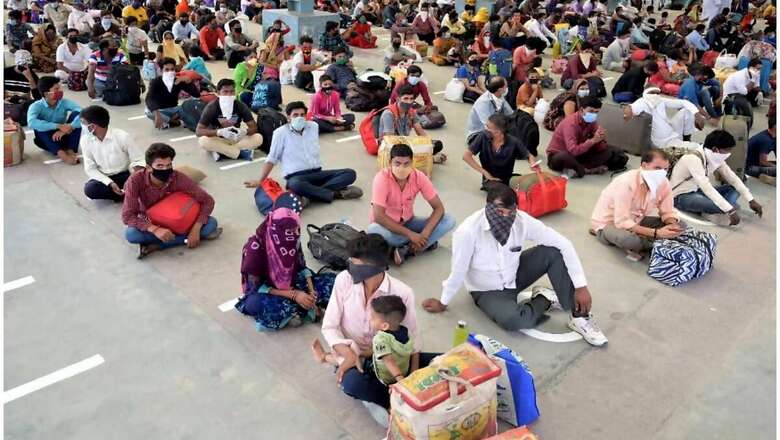
views
In its latest report, Oxfam has flagged a worrying post-pandemic trend, highlighting the further widening gap between the rich and the poor in the global world, especially India. “The wealth of Indian billionaires increased by 35 per cent during the lockdown and by 90 per cent since 2009 to $422.9 billion ranking India sixth in the world after US, China, Germany, Russia and France,” stated the report titled ‘The Inequality Virus’.
The Oxfam’s report said that the wealth of India’s top 100 billionaires shot up by Rs 12.97 trillion, which is enough money to support the vaccination drive of the 138 million poorest Indians. Only a cheque of Rs 94,045 each is required to fulfill the drive. Meanwhile, in a grim contrast, as many as 170,000 Indians suffered a lay off every hour in April last year, following the Centre’s decision to impose the world’s strictest lockdown due to the Covid-19 pandemic.
ALSO READ | Covid Condemns Billions to Poverty for a Decade: Oxfam
Moreover, for the world’s richest, it took less than 10 months to recover the financial losses caused by the pandemic, the report pointed out. However, it will take over a decade for the world’s poorest to catch up, it said.
“In fact, the increase in wealth of the top 11 billionaires of India during the pandemic could sustain the NREGS scheme for 10 years or the health ministry for 10 years,” Oxfam said, adding that the brutal pandemic can increase economic inequality in almost every country at once.
Meanwhile, Ireland’s nine billionaires saw their collective fortunes rise by €3.28 billion last year despite the deepest global recession in decades, Oxfam’s calculations indicated.
Oxfam, a confederation of 20 non-profit groups that focuses on the alleviation of global poverty, was founded in 1942. It is led by Oxfam International.
Oxfam also highlighted the fact that the impact of the virus is also being felt unevenly, with ethnic minorities in certain countries dying at higher rates and women being overrepresented in the sectors of the economy that are hardest hit by the pandemic.
The report is timed to coincide with the start of the World Economic Forum’s virtual Davos event: an entire week of global programming will be dedicated to helping leaders choose innovative and bold solutions to stem the pandemic and drive a robust recovery over the next year.
Oxfam argued in its report that fairer economies are the key to a rapid economic recovery from Covid-19.
It calculated that a temporary tax on excess profits made by the 32 global corporations that have gained the most during the pandemic could have raised $104 billion in 2020, an amount it said was enough to have provided unemployment benefits for all workers and financial support for all children and elderly people in low- and middle-income countries.
“Extreme inequality is not inevitable, but a policy choice,” said Gabriela Bucher, executive director of Oxfam International.
“The fight against inequality must be at the heart of economic rescue and recovery efforts” with investments in public services financed by a tax system where the richest individuals and corporations pay their fair share.
The report further gave an insight to the sector-wise loss of workforce in India. The country’s massive informal workforce was the worst hit as it made up 75 per cent of the 122 million jobs lost. Informal workers had relatively fewer opportunities to work from home and suffered more job loss compared to the formal sector. The 40-50 million seasonal migrant workers, typically engaged working in construction sites, factories etc. were particularly distressed, the report said.
Besides, the pandemic forced the education system to shift online, which further worsened inequalities among students. While private providers such as BYJU’s (currently valued at $10.8 billion) and Unacademy (valued at $1.45 billion) experienced exponential growth yet, just 3 per cent of the poorest 20 per cent of Indian households had access to a computer and just 9 per cent had access to the internet.
“The spread of disease was swift among poor communities, often living in crammed areas with poor sanitation and using shared common facilities such as toilets and water points,” the Oxfam reported.
“Only 6 per cent of the poorest 20 per cent households had access to non-shared sources of improved sanitation, compared to 93 per cent of the top 20 per cent households in India,” it added.
Meanwhile, in terms of caste, just 37.2 per cent of SC households and 25.9 per cent of ST households had access to non-shared sanitation facilities, compared to 65.7 per cent for the general population.
The unemployment rate among women rose from already high 15 per cent before Covid to 18 per cent. “This increase in unemployment of women can result in a loss to India’s GDP of about 8 per cent or $218 billion,” states the report.
“It is predicted that the closure of family planning services will result in 2.95 million unintended pregnancies… 1.80 million abortions (including 1.04 million unsafe abortions) and 2,165 maternal deaths,” the report stated.
“While the Coronavirus was being touted as a great equaliser in the beginning, it laid bare the stark inequalities inherent in the society soon after the lockdown was imposed,” said Oxfam India CEO Amitabh Behar.
“The deep divide between the rich and poor is proving as deadly as the virus,” said Gabriela Bucher, Executive Director of Oxfam International.
Read all the Latest News, Breaking News and Coronavirus News here




















Comments
0 comment